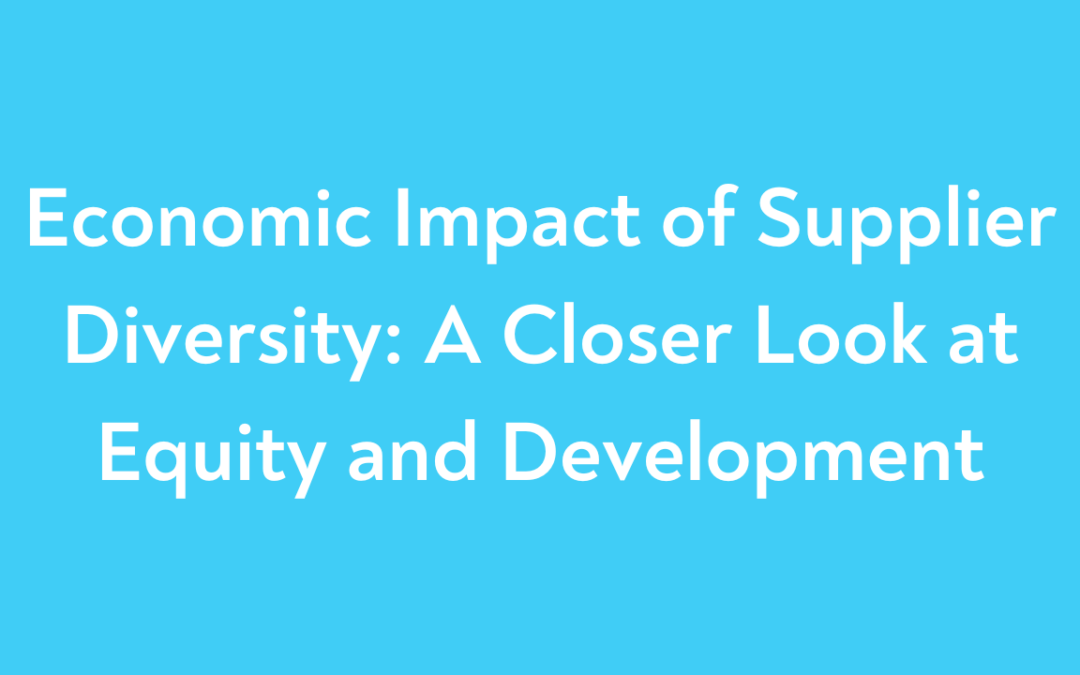Supplier diversity is not just a corporate responsibility – it’s a powerful catalyst for economic growth and development. By intentionally fostering diversity in their supply chains, businesses contribute to broader socioeconomic outcomes, including job creation, wealth distribution, and increased development. In this article, we’ll look into the many ways supplier diversity shapes our economy and communities, driving equitable development and prosperity for all.
Empowering Minority-Owned Businesses
At the heart of supplier diversity is the recognition of the value that minority-owned businesses bring to the economy. These enterprises, often overlooked and under-appreciated, are brimming with entrepreneurial spirit and innovative ideas. According to a 2020 report from the Minority Business Development Agency (MBDA), minority-owned businesses in the U.S. generate more than $1 trillion in annual economic output.
Supplier diversity initiatives unlock the potential of these businesses by connecting them with larger corporations – this not only propels the growth of these companies, but also circulates wealth within the local community.
Driving Job Creation and Economic Activity
Diverse suppliers, often being small-to-medium-sized enterprises (SMEs), are significant job creators. By supporting these businesses, supplier diversity initiatives contribute to employment opportunities, particularly within disadvantaged communities. In addition, the economic activity generated by these businesses – from purchasing raw materials to investing in equipment – has a ripple effect on the entire local economy.
A study by the National Minority Supplier Development Council (NMSDC) found that certified minority-owned businesses generated more than $400 billion in economic output in 2018, contributing to the creation and preservation of more than 2.2 million jobs. According to American Express’s 2019 “State of Women-Owned Businesses Report”, women-owned businesses in the United States generated $1.8 trillion in revenue and employed over 9.4 million people. The U.S. Small Business Administration reported in 2020 that there were 2.52 million veteran-owned businesses in the U.S., contributing approximately $1.14 trillion to the economy. In 2019, prior to the COVID-19 pandemic, there were approximately 2.6 million Black-owned businesses in the U.S, according to a report from the U.S. Small Business Administration. The combined annual sales of these businesses was nearly $150 billion.
Promoting Local Development and Sustainability
Supplier diversity, especially when paired with local sourcing, results in significant community development. Investments made by diverse suppliers – whether it’s opening a new facility or hiring local talent – contribute to the vibrancy and growth of the local community. Moreover, many diverse suppliers are committed to sustainable practices, ensuring their businesses are not only economically aware but also environmentally beneficial.
Strengthening Social Cohesion
Beyond measurable economic impact, supplier diversity fosters social cohesion and community empowerment. As diverse suppliers flourish, they set an inspiring precedent for aspiring entrepreneurs within their communities. They also contribute to community development through philanthropy and community service, reinforcing the social fabric of the community.
Closing the Wealth Gap
By promoting economic inclusion and growth in underrepresented communities, supplier diversity initiatives directly contribute to closing the wealth gap. As diverse suppliers flourish, they generate wealth within their communities, which can be invested in education, housing, healthcare, and other avenues that contribute to development and wealth creation.
Promoting Economic Justice
A report by the Business Case for Racial Equity highlights that closing the racial equity gap in the U.S. can potentially result in a $8 trillion gain in GDP by 2050. This underscores the economic value of promoting equity and inclusivity, which are key aspects of supplier diversity.
Ultimately, supplier diversity is a matter of economic justice. It’s about ensuring that everyone – regardless of their race, gender, disability, or background – has equal opportunities to succeed in the business world. Through promoting supplier diversity, we’re taking steps towards a more equitable and just economy.
The Future of Supplier Diversity
Diverse suppliers, with their unique capabilities and resilience, will play a crucial role in shaping a sustainable economy. By empowering diverse suppliers, we are contributing to the development of local communities and driving equitable economic growth. Ultimately, supplier diversity is not only an investment in our economy but also a commitment to economic justice and a more inclusive, equitable future.
Key Takeaways
- Supplier diversity is a powerful catalyst for economic growth and development, driving job creation, innovation, and economic activity within local communities.
- Supplier diversity contributes to local development and sustainability, with diverse suppliers often investing significantly within their local communities.
- Beyond economic impact, supplier diversity promotes social cohesion and community empowerment.
- Supplier diversity initiatives directly contribute to closing the wealth gap, promoting economic inclusion and growth in underrepresented communities.
- Supplier diversity is a matter of economic justice, ensuring equal opportunities for everyone in the business world.


Recent Comments